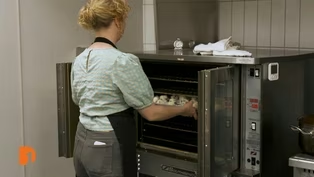
University of Michigan creates AI tools for campus, students
Clip: Season 8 Episode 44 | 6m 35sVideo has Closed Captions
The University of Michigan becomes the first college to create AI tools for its students.
The University of Michigan has become the first major university in the nation to create its own artificial intelligence tools. One Detroit producer Will Glover talks with University of Michigan Vice President for Information Technology and Chief Information Officer Dr. Ravi Pendse, Associate Professor David Jurgens and student Shantasia King about the AI tools and their impact in the classroom.
Problems playing video? | Closed Captioning Feedback
Problems playing video? | Closed Captioning Feedback
One Detroit is a local public television program presented by Detroit PBS

University of Michigan creates AI tools for campus, students
Clip: Season 8 Episode 44 | 6m 35sVideo has Closed Captions
The University of Michigan has become the first major university in the nation to create its own artificial intelligence tools. One Detroit producer Will Glover talks with University of Michigan Vice President for Information Technology and Chief Information Officer Dr. Ravi Pendse, Associate Professor David Jurgens and student Shantasia King about the AI tools and their impact in the classroom.
Problems playing video? | Closed Captioning Feedback
How to Watch One Detroit
One Detroit is available to stream on pbs.org and the free PBS App, available on iPhone, Apple TV, Android TV, Android smartphones, Amazon Fire TV, Amazon Fire Tablet, Roku, Samsung Smart TV, and Vizio.
Providing Support for PBS.org
Learn Moreabout PBS online sponsorship(bright music) At the end of November 2022, San Francisco-based company OpenAI released the artificial intelligence chatbot ChatGPT that can write entire essays, create reports, do administrative tasks, and a laundry list of other things.
In August 2023, the University of Michigan became the first major educational institute to release its own artificial intelligence tools made specifically for students, faculty, and staff.
VP of Information Technology and Chief Information Officer for U of M, Dr. Ravi Pendse, played a role in getting the AI tools created.
- UM essentially developed, partnered with vendor partners and introduced three tools.
One is called the UM GPT.
- [Narrator] UM GPT functions like OpenAI's ChatGPT with the major difference being the data received and produced by UM GPT is kept private by the university.
- Second tool that we rolled out then was we made a code-less platform available to the entire campus community called Maizey.
What Maizey does is essentially anybody, no programming coding experience required, can actually take the Maizey platform, point it to their appropriate data source.
So if you have some data say in your Google Drive or Dropbox or on the web or your bunch of videos, you can point Maizey to it and what Maizey will do is it will ingest and index all of that information and then it's available to you as your own personal AI assistant for you to query and ask questions.
- [Narrator] The third release from U of M is an AI toolkit that provides the resources and computing power for campus AI research and experts.
- UM GPT toolkit provides access to those researchers who are the AI experts who can then start building their own models.
- [Narrator] Because of the capabilities of the AI tools, educators across the country have concerns over potential plagiarism, cheating, and abuse by students.
Currently there is no software that can reliably tell if AI has been used in writing, image generation, audio ,or video content, which means there's no way to definitively know if a student has used artificial intelligence in their work.
So institutions like U of M had a choice to make.
- We had two ways of looking at it at Michigan.
One way was we could just say we'll just step back and let's just wait out and see what the world will do and then maybe we can react.
The other way was let's thoughtfully approach this technology and let's lead.
- [Narrator] Faculty at the school had been thinking about how to integrate AI into their courses.
David Jurgens is an Associate Professor in the School of Information's Department of Computer Science and taught a first of its kind course called "How to Use AI Effectively."
- As a university we're trying to figure out how to get students to engage with this in a productive collaborative way without sort of losing their critical thinking skills.
So the course was designed to walk students through a bunch of different exercises on how to do that, and it was an experimental course, we were learning how to do it as well as the students were at the same time.
- [Narrator] U of M student Shantasia King is majoring in user experience at U of M's School of Information.
She took Jurgens' course.
- Because it was his class that kind of hit that light switch for me.
I started off I could be a student, just asking it to give me the answers, complete this homework for me, but you're not learning anything.
Cutting corners will get you nowhere, but when you actually sit down and you can have it create test studies for you or create like study plans or study guides or if you're really stuck on something, this can become your own personal tutor right here.
I just kind of had to change my outlook towards ChatGPT, understanding that it's not the end all be all.
It won't provide you exactly everything that you're looking for.
So you don't want your work to get lost in it.
So you have to work with it, provide the context that you wanna see and you will be really surprised at what you can work with it and get back.
- [Narrator] The way Shantasia is thinking about AI is what Jurgens was hoping his course would achieve.
- We teach them different ways to use that tool to be better versions of themselves but not to replace themselves with AI.
So I tell students, maybe you could get ideas for what to write about.
You could ask ChatGPT questions on how to improve your draft, but to think about it like a teaching assistant, you can use it as a kind of always collaborative person who's awake any hour of the day who could work with you to like help you, provide feedback and guidance on where it could be improved.
- [Narrator] Shantasia is seeing results outside of the classroom.
- It really has opened the doors to a lot of things for me as a student as far as not even only academically, but when someone asks me to create your vision statement or show me what your future looks like or what does the business that you wanna run look like, I happily go and talk to ChatGPT.
I don't just ask it to tell me, I tell it what I wanna see and then ask it to input its input.
- [Narrator] Artificial intelligence tools are also being developed to remove barriers to gaining access to higher education.
- Yearly, every year about $4 billion in Pell grants go unused, we are building a public Maizey and what I mean by public Maizey would be something that would be publicly available to the entire country to use.
And what this Maizey will do is it is actually ingesting and indexing all of the scholarships that are out there.
Not just Pell grants.
- [Narrator] This public version of Maizey would make it easier to find out what scholarships and grants a student is eligible for.
- You as an user, you will be able to type in your situation where you may say, I'm 17-year-old high school student.
I have this kind of GPA.
I've done these things and I'm interested in these areas.
Can you identify for me some scholarships that are available?
And then this system, in probably 15 seconds, will find you all of the relevant scholarships that you may have opportunity for.
What I said to my team when I challenged them is I said, "Even if 20 people are able to go to college because of this, it'll be worth it."
- [Narrator] As U of M's campus community and the public use these AI tools, the technology will continue to improve.
But Dr Pendse's optimism for the future rests more in people than artificial intelligence.
- The young people are so wonderful, and I'm so wanting each one of them to contribute something positive to the world.
So I'm very confident that no matter what field they choose to pursue, as long as they're passionate about it, the AI tools will be available and they can change the world for better.
Downtown Boxing Gym starts new culinary program for students
Video has Closed Captions
Clip: S8 Ep44 | 5m 59s | The Downtown Boxing Gym starts a culinary curriculum to teach children cooking skills. (5m 59s)
The history of Asian corned beef egg rolls in Detroit
Video has Closed Captions
Clip: S8 Ep44 | 6m 53s | The history of Detroit’s iconic Asian corned beef egg rolls, a Truly Detroit delicacy. (6m 53s)
One Detroit Weekend: May 2, 2024
Video has Closed Captions
Clip: S8 Ep44 | 1m 45s | Cinco de Mayo celebrations, Neil DeGrasse Tyson in Detroit and more upcoming this weekend. (1m 45s)
Providing Support for PBS.org
Learn Moreabout PBS online sponsorship
- News and Public Affairs

Top journalists deliver compelling original analysis of the hour's headlines.

- News and Public Affairs

FRONTLINE is investigative journalism that questions, explains and changes our world.












Support for PBS provided by:
One Detroit is a local public television program presented by Detroit PBS


